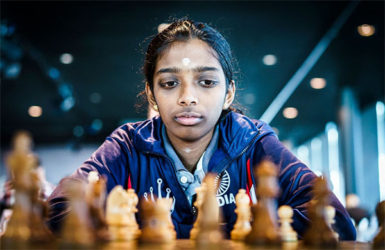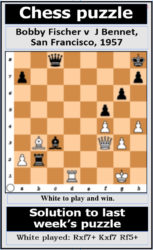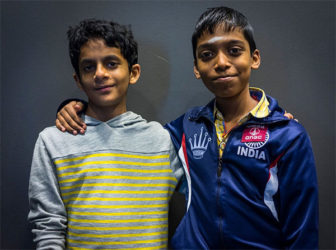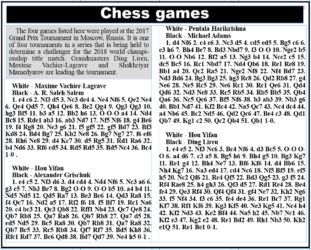‘There is a local feeling connected with this occasion, too strong to be resisted… ‘ – Daniel Webster (1782-1852), American lawyer and orator during an address commemorating the 200th anniversary of the landing of the Pilgrims.
Recently, the Minister of Education Dr Rupert Roopnaraine agreed to a principled position of having chess started as a

pilot project in a sprinkling of schools. For the column, it was a significant occasion, but for many, the occasion may  have gone unnoticed. The introduction of chess in schools is a novel experiment for the education of the nation’s children. The column is yet to recall an instance where structured chess has impacted negatively upon a nation.
have gone unnoticed. The introduction of chess in schools is a novel experiment for the education of the nation’s children. The column is yet to recall an instance where structured chess has impacted negatively upon a nation.
It took the nation interminably long to get the engines of chess ticking, although they are currently idling. The column does not  represent the Guyana Chess Federation (GCF); it is an independent entity. In instances where it is required, however, the column would confirm its satisfaction with the way things are progressing for chess, such as with this pro-active decision by the Minister. Through school chess, India has produced two international chess superstars, Nihal
represent the Guyana Chess Federation (GCF); it is an independent entity. In instances where it is required, however, the column would confirm its satisfaction with the way things are progressing for chess, such as with this pro-active decision by the Minister. Through school chess, India has produced two international chess superstars, Nihal

Sarin, 12, and Praggnanandhaa Rameshbabu, 11, two of the youngest international chess masters in history. Readers would recall that India had earlier cultivated a world chess champion in Viswanathan Anand. He lost the title to Norway’s Magnus Carlsen in 2013.
But however attractive the cultivation of champions may sound, the task is not an easy one to accomplish, although it is certainly not impossible. Minister Roopnaraine has now commenced the lengthy and strenuous process. The Chess Olympiad remains Guyana’s best hope of progressing to international recognition in chess. At the Olympiad, it is easier to obtain an International Master (IM) title than it is in the case of other international tournaments. The Chess Olympiad is structured in such a manner as to give everyone a fighting chance of leaving with a title.
task is not an easy one to accomplish, although it is certainly not impossible. Minister Roopnaraine has now commenced the lengthy and strenuous process. The Chess Olympiad remains Guyana’s best hope of progressing to international recognition in chess. At the Olympiad, it is easier to obtain an International Master (IM) title than it is in the case of other international tournaments. The Chess Olympiad is structured in such a manner as to give everyone a fighting chance of leaving with a title.









